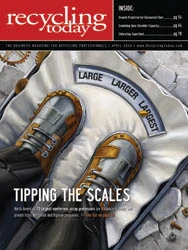NIMBY (not in my backyard) may be a problematic sentiment for many scrap metal recyclers, but Niagara Metals is working to adjust that attitude by demonstrating how a company can be successful and still be a good neighbor.
To accomplish this goal in such a fluid market may take a combination of skill, hard work and luck, but Todd Levin, president and owner of Niagara Metals, says its personal touch gives Niagara Metals an advantage.
The company, primarily a ferrous scrap processor, operates from a single location in Niagara Falls, N.Y. From this vantage point, Niagara Metals sees great things looking forward. And, while competition is fierce, Levin says there is always room for smaller players.
Many people may feel that competing with large, multi-national firms is a daunting job. Levin acknowledges the challenges, but says his 20-person scrap metal company is nimble enough to allow it to go head to head with these much larger competitors.
“We feel there will always be a place for well-run independent recyclers,” Levin says. “We are here because we feel we can offer better service and quicker responses to our customers at every level, from peddlers to steel mills. There is no substitute for a true owner/operator who can deal directly with customers and keep employees motivated,” he adds.
A SOLID PEDIGREE
Levin founded Niagara Metals in 2007. Although the company is still relatively young, Levin has a long pedigree in the scrap metal business. The Levin family has been involved in the metals recycling industry in western New York for four generations, starting with its original scrap metal company, Louis Levin & Co.
That company was acquired by Cranford, N.J.-based Metalico Inc., a consolidator that has grown its position in New York, Pennsylvania and Ohio through multiple acquisitions.
| Niagara Metals Receives Honor |
|
Niagara USA Chamber, an organization of businesses in the Niagara County, N.Y., area, has named Niagara Metals, a Niagara Falls, N.Y., scrap metal recycling firm, its Business of the Year for 2010. The award was announced at a meeting Feb. 27. In accepting the award, Todd Levin, owner of the company, recognized the Niagara Metals staff for its success. “I am totally honored, but we aren’t close to where we want to be,” Levin said. “We have so much further we want to go and couldn’t go there without the great staff we have.” In honoring Niagara Metals, the Niagara USA Chamber noted that various submissions touched on a number of positive steps the company has taken since opening its first scrap yard, including creating more than a dozen jobs in the area without government grants or loans; refurbishing blighted property into a fully functioning business; recycling more than 350 million pounds of ferrous and nonferrous metals; using local contractors and vendors; reconstructing a CSX rail siding, which reduced shipments from 250 truckloads per month to 100 rail car loads per month; and contributing to various charities in the area, including Mercy Flight and March and Dimes, as well as providing scholarships to Buffalo Prep. |
“I was very lucky to work alongside my father, Bob Levin, who taught me how to build and maintain relationships with both suppliers and mills,” Levin says. “I am also fortunate to have had the opportunity to help manage and grow a multiple-facility, publicly traded scrap company that acquired the family business back in 1998.”
While Levin worked for Metalico, he readily admits that he prefers working for a private company. “We are successful because we base our business on relationships. We are well-respected by other scrap metal dealers and demolition firms,” he says.
“I feel that I have more of an advantage calling on people as a private company,” Levin continues. “People like to deal with the owner of a company.”
The company has been recognized by Niagara area groups because of its work in the community, including its regular use of area subcontractors, such as plumbers, electricians and transporters, which has a positive impact in the community.
STARTING AT LESS THAN ZERO
Niagara Metals took shape beginning in 2007, when the company purchased property with rail access in Niagara Falls. The first step to get the company up and running was cleaning up the site, which, Levin says, was in disrepair.
Levin notes that the former tenant of the property left it at “less than zero.” As the site was in a visible section of Niagara Falls, it had become a huge eyesore to the city’s residents.
The cleanup, which took nearly a year, included clearing dilapidated buildings and removing piles of rubble. While the job of cleaning up the site was significant, Levin says Niagara Metals was able to preserve a concrete foundation, an asset for a metal recycling firm.
In sketching out the company’s plan for the site, Levin says city fathers were skeptical that Niagara Metals could improve the site and return it to a beneficial use. However, the company was able to repair the site, making it a fully functional, safe and clean operation, Levin says. Improvements included putting a fresh coat of paint on the building and making sure the containers at the site were clean.
Levin points out that all of the site improvements were done without accepting any financial assistance from government grants or agencies.
The initial skepticism that city officials held has disappeared, and, Levin says, many of those former skeptics are not only pleased with the redevelopment of the site but often visit Niagara Metals.
Despite this turnabout with officials in Niagara Falls, the company has run into opposition to its proposal to open up a feeder yard in Royalton, N.Y., in eastern Niagara County.
Levin says, “When opening a new facility, we look for a high visibility and easy access for traffic. We also look for areas where the local businesses and consumers will benefit from increased competition for their scrap metal.”
The company says it hopes the Royalton yard will be the first of several feeder yards Niagara Metals opens in western New York within the next several years.
While the company received a special-use permit to operate the plant in Royalton, opponents have attempted to keep the company from expanding into the community.
Niagara Metals’ opponents may be vocal, but there are those who see the value of the company locating in the city. In a local press report, Royalton Supervisor Richard Lang says Niagara not only has met all applications required and that the location is zoned for industrial use, but that the company is reputable. “They’re up front with us,” he says.
“I feel it will be a benefit to the town. We need work in the area,” he adds.
For Levin, a lifelong Buffalo-area resident, the challenge related to the Royalton feeder yard is worth pursuing.
GROWTH MINDED
The Niagara Falls facility covers 50 acres and is paved with concrete throughout. The modern facility is equipped with a CSX rail siding that can accommodate 20 rail cars. Niagara Metals operates three material handlers, two mobile shears, and five articulated loaders as well as a number of roll-off and lugger trucks and tractor trailers. The yard also features a nonferrous warehouse and an indoor car crushing operation.
Niagara Metals may be small compared to some of its competitors in the surrounding area, but the company is able to process approximately 150,000 tons of scrap metal per year from its single location. It services customers within a 500-mile radius of the yard, Levin says.
Although ferrous processing and sales are the core of Niagara Metals’ business, the company has carefully diversified into other areas, such as transloading, mill byproducts and handling and processing nonferrous metals.
A CONSERVATIVE APPROACH
Having the personal touch may give Niagara Metals an edge, but with markets so uncertain, Levin says the company has to be conservative. Noting that prices for some grades of ferrous scrap have displayed price swings of more than 200 percent throughout the past several years, Levin says Niagara’s financial health and stability give the company flexibility.
With rising prices for ferrous and nonferrous metals, Niagara Metals’ strategy is to constantly turn its inventory, Levin says. “There is plenty of room for prices to fall off, so we are careful when looking at hard-to-process material,” he adds.
During the depressed markets of 2009, the company relied on its diversification for cash flow and was able to capitalize on high inventories when markets improved, he adds.
A correction in scrap metal prices may be coming down the pike. Levin says that at the current ferrous scrap prices, it will be tough for steel mills to pass on further price increases to their customers.
Even though Niagara is a small company, Levin says he puts a significant amount of stock in his employees, noting that all of Niagara’s employees are “pulling the rope in the same direction.”
Most of the company’s employees are from the local community and the company has had very little turnover since it began operations.
Levin also says the company emphasizes safety by requiring all employees to receive weekly safety and health training, which contributes to the company’s “outstanding” safety record.
Niagara Metals has been able to thrive in up and down markets because of its efficient work force and facility, hands-on management, financial stability and strong relations with suppliers and consumers, Levin says.
“We are very pleased with our growth over the past three years, and are carefully taking steps that will enable the company to continue to thrive,” Levin says.
Small steps maybe, but for Niagara Metals, these steps may lead to greater things.

Explore the April 2010 Issue
Check out more from this issue and find your next story to read.
Latest from Recycling Today
- Toppoint Holdings expands chassis fleet
- Lego creates miniature tire recycling market
- Lux Research webinar examines chemical recycling timetables
- Plastics producer tracks pulse of wire recycling market
- Republic Services, Blue Polymers open Indianapolis recycling complex
- Altilium produces EV battery cells using recycled materials
- Brightmark enters subsidiaries of Indiana recycling facility into Chapter 11
- Freepoint Eco-Systems receives $50M loan for plastics recycling facility





